Rotterdam Rules | Maritime Law
VerifiedAdded on 2022/08/31
|8
|2495
|20
AI Summary
Contribute Materials
Your contribution can guide someone’s learning journey. Share your
documents today.
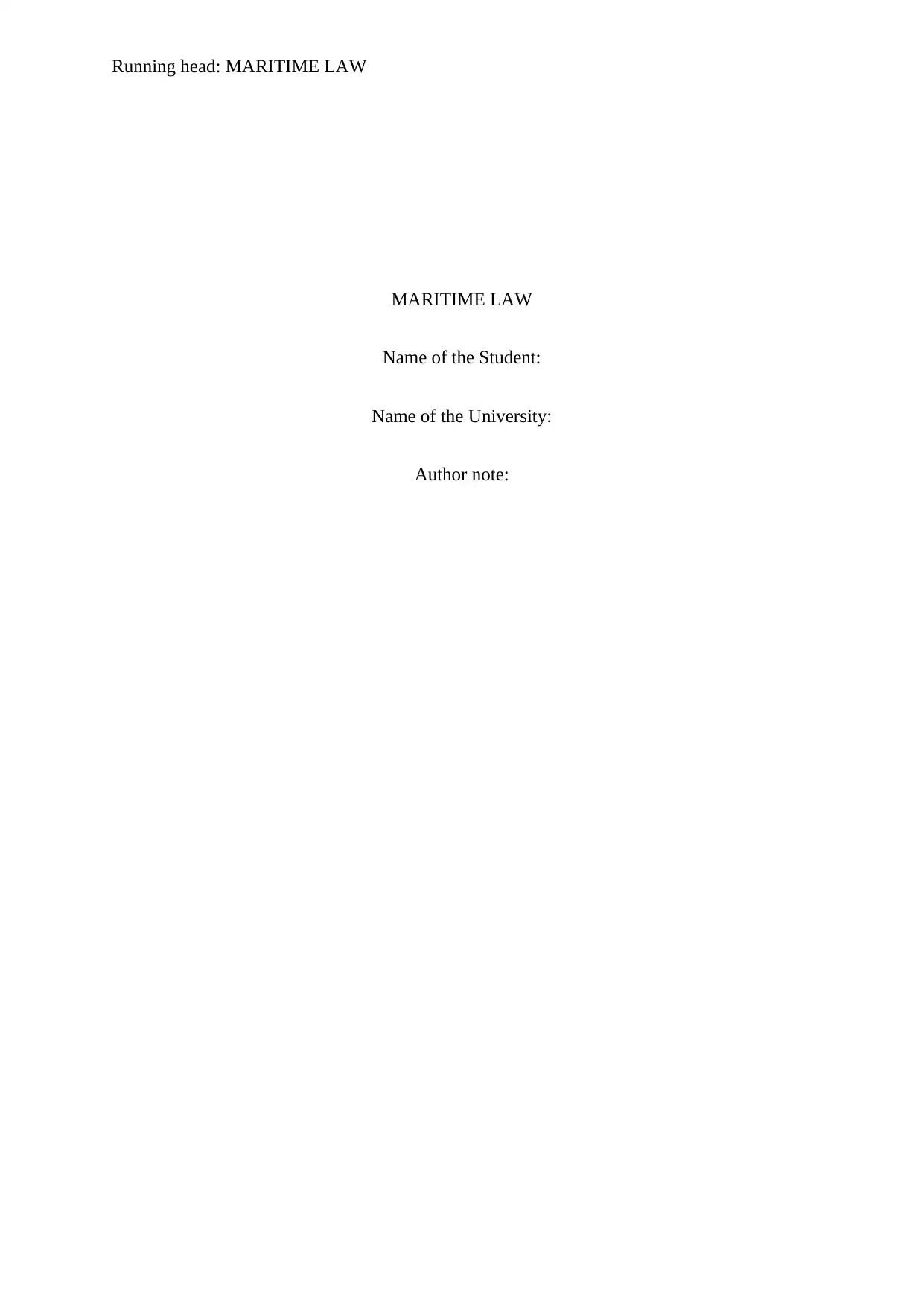
Running head: MARITIME LAW
MARITIME LAW
Name of the Student:
Name of the University:
Author note:
MARITIME LAW
Name of the Student:
Name of the University:
Author note:
Secure Best Marks with AI Grader
Need help grading? Try our AI Grader for instant feedback on your assignments.
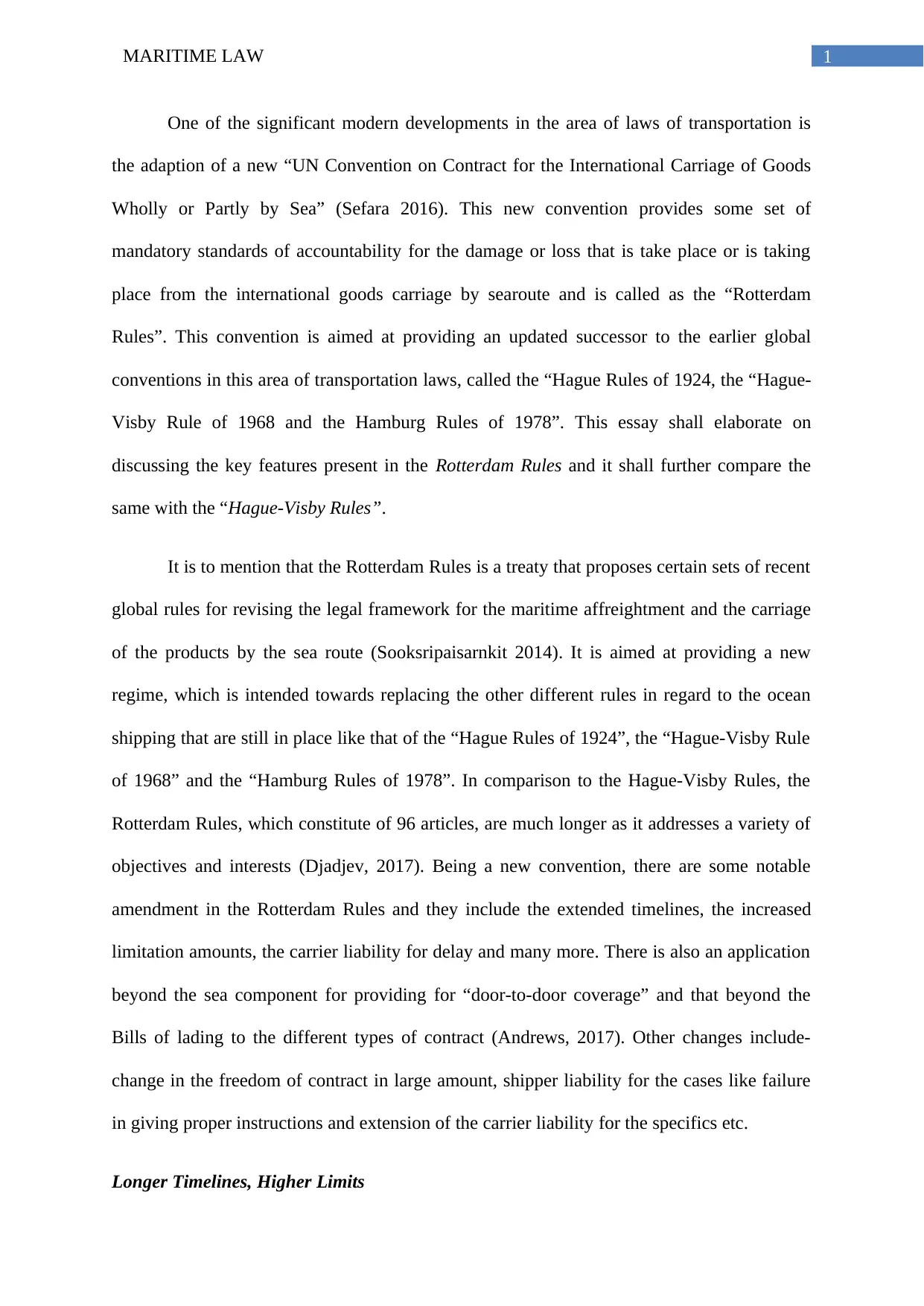
1MARITIME LAW
One of the significant modern developments in the area of laws of transportation is
the adaption of a new “UN Convention on Contract for the International Carriage of Goods
Wholly or Partly by Sea” (Sefara 2016). This new convention provides some set of
mandatory standards of accountability for the damage or loss that is take place or is taking
place from the international goods carriage by searoute and is called as the “Rotterdam
Rules”. This convention is aimed at providing an updated successor to the earlier global
conventions in this area of transportation laws, called the “Hague Rules of 1924, the “Hague-
Visby Rule of 1968 and the Hamburg Rules of 1978”. This essay shall elaborate on
discussing the key features present in the Rotterdam Rules and it shall further compare the
same with the “Hague-Visby Rules”.
It is to mention that the Rotterdam Rules is a treaty that proposes certain sets of recent
global rules for revising the legal framework for the maritime affreightment and the carriage
of the products by the sea route (Sooksripaisarnkit 2014). It is aimed at providing a new
regime, which is intended towards replacing the other different rules in regard to the ocean
shipping that are still in place like that of the “Hague Rules of 1924”, the “Hague-Visby Rule
of 1968” and the “Hamburg Rules of 1978”. In comparison to the Hague-Visby Rules, the
Rotterdam Rules, which constitute of 96 articles, are much longer as it addresses a variety of
objectives and interests (Djadjev, 2017). Being a new convention, there are some notable
amendment in the Rotterdam Rules and they include the extended timelines, the increased
limitation amounts, the carrier liability for delay and many more. There is also an application
beyond the sea component for providing for “door-to-door coverage” and that beyond the
Bills of lading to the different types of contract (Andrews, 2017). Other changes include-
change in the freedom of contract in large amount, shipper liability for the cases like failure
in giving proper instructions and extension of the carrier liability for the specifics etc.
Longer Timelines, Higher Limits
One of the significant modern developments in the area of laws of transportation is
the adaption of a new “UN Convention on Contract for the International Carriage of Goods
Wholly or Partly by Sea” (Sefara 2016). This new convention provides some set of
mandatory standards of accountability for the damage or loss that is take place or is taking
place from the international goods carriage by searoute and is called as the “Rotterdam
Rules”. This convention is aimed at providing an updated successor to the earlier global
conventions in this area of transportation laws, called the “Hague Rules of 1924, the “Hague-
Visby Rule of 1968 and the Hamburg Rules of 1978”. This essay shall elaborate on
discussing the key features present in the Rotterdam Rules and it shall further compare the
same with the “Hague-Visby Rules”.
It is to mention that the Rotterdam Rules is a treaty that proposes certain sets of recent
global rules for revising the legal framework for the maritime affreightment and the carriage
of the products by the sea route (Sooksripaisarnkit 2014). It is aimed at providing a new
regime, which is intended towards replacing the other different rules in regard to the ocean
shipping that are still in place like that of the “Hague Rules of 1924”, the “Hague-Visby Rule
of 1968” and the “Hamburg Rules of 1978”. In comparison to the Hague-Visby Rules, the
Rotterdam Rules, which constitute of 96 articles, are much longer as it addresses a variety of
objectives and interests (Djadjev, 2017). Being a new convention, there are some notable
amendment in the Rotterdam Rules and they include the extended timelines, the increased
limitation amounts, the carrier liability for delay and many more. There is also an application
beyond the sea component for providing for “door-to-door coverage” and that beyond the
Bills of lading to the different types of contract (Andrews, 2017). Other changes include-
change in the freedom of contract in large amount, shipper liability for the cases like failure
in giving proper instructions and extension of the carrier liability for the specifics etc.
Longer Timelines, Higher Limits
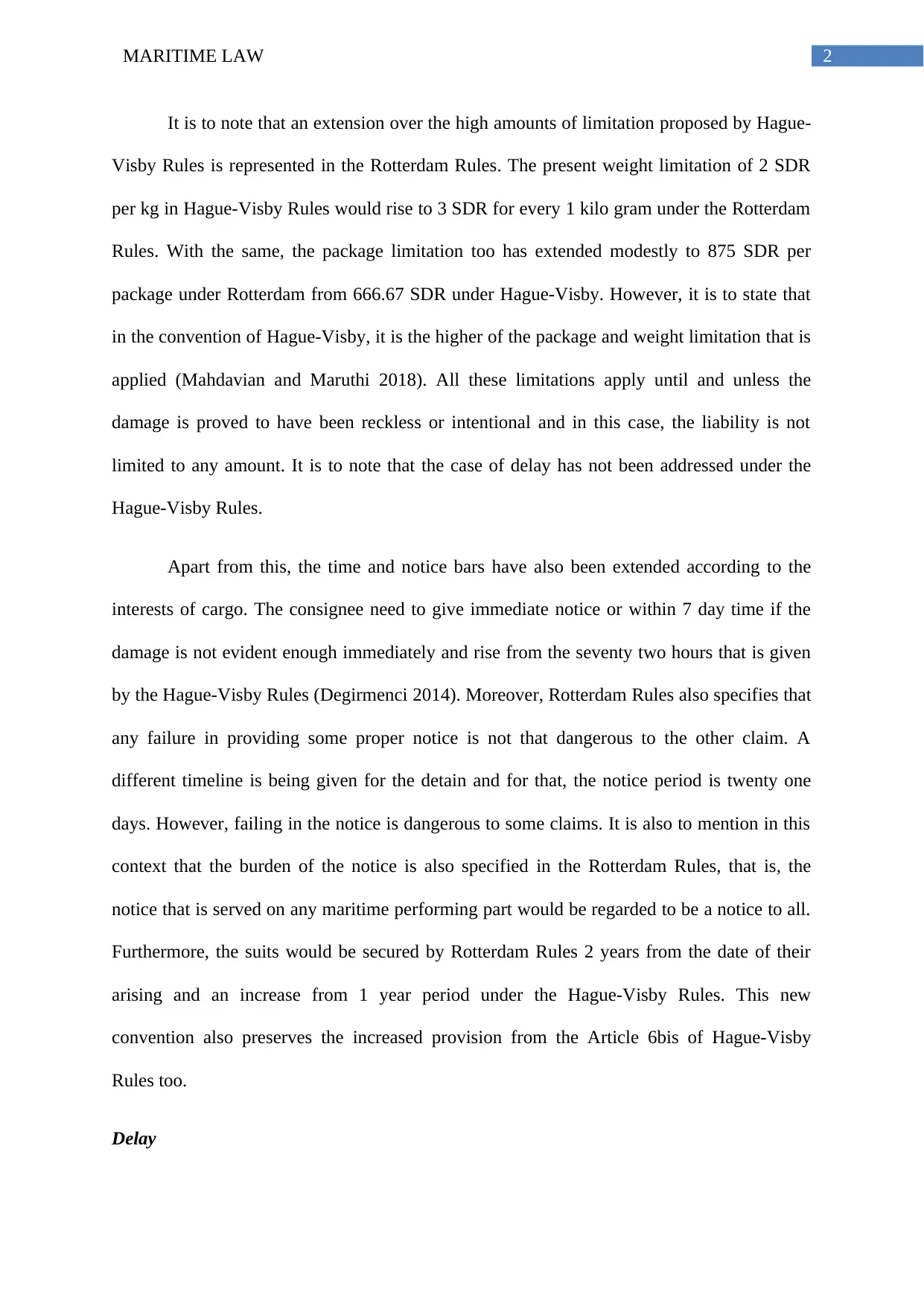
2MARITIME LAW
It is to note that an extension over the high amounts of limitation proposed by Hague-
Visby Rules is represented in the Rotterdam Rules. The present weight limitation of 2 SDR
per kg in Hague-Visby Rules would rise to 3 SDR for every 1 kilo gram under the Rotterdam
Rules. With the same, the package limitation too has extended modestly to 875 SDR per
package under Rotterdam from 666.67 SDR under Hague-Visby. However, it is to state that
in the convention of Hague-Visby, it is the higher of the package and weight limitation that is
applied (Mahdavian and Maruthi 2018). All these limitations apply until and unless the
damage is proved to have been reckless or intentional and in this case, the liability is not
limited to any amount. It is to note that the case of delay has not been addressed under the
Hague-Visby Rules.
Apart from this, the time and notice bars have also been extended according to the
interests of cargo. The consignee need to give immediate notice or within 7 day time if the
damage is not evident enough immediately and rise from the seventy two hours that is given
by the Hague-Visby Rules (Degirmenci 2014). Moreover, Rotterdam Rules also specifies that
any failure in providing some proper notice is not that dangerous to the other claim. A
different timeline is being given for the detain and for that, the notice period is twenty one
days. However, failing in the notice is dangerous to some claims. It is also to mention in this
context that the burden of the notice is also specified in the Rotterdam Rules, that is, the
notice that is served on any maritime performing part would be regarded to be a notice to all.
Furthermore, the suits would be secured by Rotterdam Rules 2 years from the date of their
arising and an increase from 1 year period under the Hague-Visby Rules. This new
convention also preserves the increased provision from the Article 6bis of Hague-Visby
Rules too.
Delay
It is to note that an extension over the high amounts of limitation proposed by Hague-
Visby Rules is represented in the Rotterdam Rules. The present weight limitation of 2 SDR
per kg in Hague-Visby Rules would rise to 3 SDR for every 1 kilo gram under the Rotterdam
Rules. With the same, the package limitation too has extended modestly to 875 SDR per
package under Rotterdam from 666.67 SDR under Hague-Visby. However, it is to state that
in the convention of Hague-Visby, it is the higher of the package and weight limitation that is
applied (Mahdavian and Maruthi 2018). All these limitations apply until and unless the
damage is proved to have been reckless or intentional and in this case, the liability is not
limited to any amount. It is to note that the case of delay has not been addressed under the
Hague-Visby Rules.
Apart from this, the time and notice bars have also been extended according to the
interests of cargo. The consignee need to give immediate notice or within 7 day time if the
damage is not evident enough immediately and rise from the seventy two hours that is given
by the Hague-Visby Rules (Degirmenci 2014). Moreover, Rotterdam Rules also specifies that
any failure in providing some proper notice is not that dangerous to the other claim. A
different timeline is being given for the detain and for that, the notice period is twenty one
days. However, failing in the notice is dangerous to some claims. It is also to mention in this
context that the burden of the notice is also specified in the Rotterdam Rules, that is, the
notice that is served on any maritime performing part would be regarded to be a notice to all.
Furthermore, the suits would be secured by Rotterdam Rules 2 years from the date of their
arising and an increase from 1 year period under the Hague-Visby Rules. This new
convention also preserves the increased provision from the Article 6bis of Hague-Visby
Rules too.
Delay
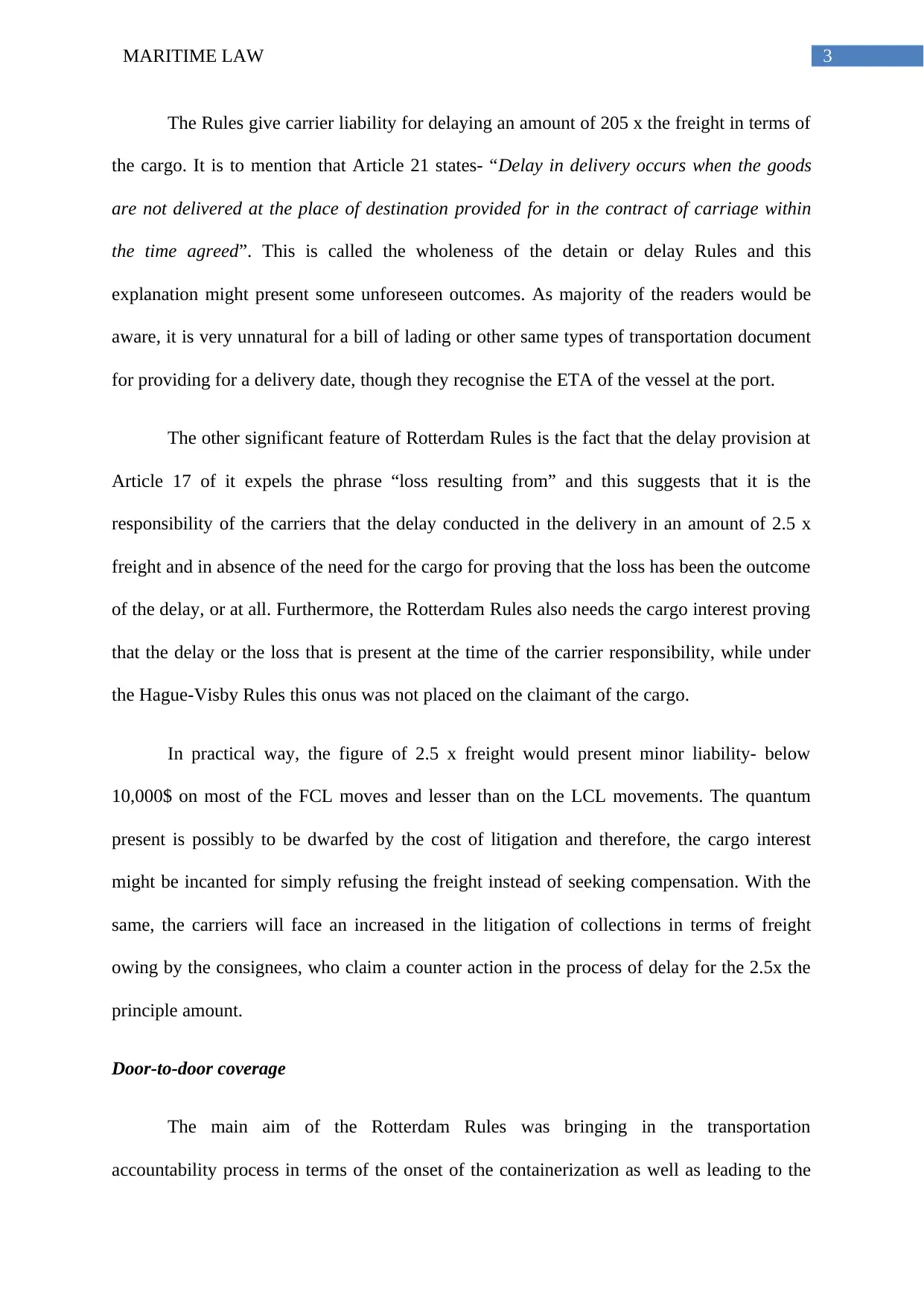
3MARITIME LAW
The Rules give carrier liability for delaying an amount of 205 x the freight in terms of
the cargo. It is to mention that Article 21 states- “Delay in delivery occurs when the goods
are not delivered at the place of destination provided for in the contract of carriage within
the time agreed”. This is called the wholeness of the detain or delay Rules and this
explanation might present some unforeseen outcomes. As majority of the readers would be
aware, it is very unnatural for a bill of lading or other same types of transportation document
for providing for a delivery date, though they recognise the ETA of the vessel at the port.
The other significant feature of Rotterdam Rules is the fact that the delay provision at
Article 17 of it expels the phrase “loss resulting from” and this suggests that it is the
responsibility of the carriers that the delay conducted in the delivery in an amount of 2.5 x
freight and in absence of the need for the cargo for proving that the loss has been the outcome
of the delay, or at all. Furthermore, the Rotterdam Rules also needs the cargo interest proving
that the delay or the loss that is present at the time of the carrier responsibility, while under
the Hague-Visby Rules this onus was not placed on the claimant of the cargo.
In practical way, the figure of 2.5 x freight would present minor liability- below
10,000$ on most of the FCL moves and lesser than on the LCL movements. The quantum
present is possibly to be dwarfed by the cost of litigation and therefore, the cargo interest
might be incanted for simply refusing the freight instead of seeking compensation. With the
same, the carriers will face an increased in the litigation of collections in terms of freight
owing by the consignees, who claim a counter action in the process of delay for the 2.5x the
principle amount.
Door-to-door coverage
The main aim of the Rotterdam Rules was bringing in the transportation
accountability process in terms of the onset of the containerization as well as leading to the
The Rules give carrier liability for delaying an amount of 205 x the freight in terms of
the cargo. It is to mention that Article 21 states- “Delay in delivery occurs when the goods
are not delivered at the place of destination provided for in the contract of carriage within
the time agreed”. This is called the wholeness of the detain or delay Rules and this
explanation might present some unforeseen outcomes. As majority of the readers would be
aware, it is very unnatural for a bill of lading or other same types of transportation document
for providing for a delivery date, though they recognise the ETA of the vessel at the port.
The other significant feature of Rotterdam Rules is the fact that the delay provision at
Article 17 of it expels the phrase “loss resulting from” and this suggests that it is the
responsibility of the carriers that the delay conducted in the delivery in an amount of 2.5 x
freight and in absence of the need for the cargo for proving that the loss has been the outcome
of the delay, or at all. Furthermore, the Rotterdam Rules also needs the cargo interest proving
that the delay or the loss that is present at the time of the carrier responsibility, while under
the Hague-Visby Rules this onus was not placed on the claimant of the cargo.
In practical way, the figure of 2.5 x freight would present minor liability- below
10,000$ on most of the FCL moves and lesser than on the LCL movements. The quantum
present is possibly to be dwarfed by the cost of litigation and therefore, the cargo interest
might be incanted for simply refusing the freight instead of seeking compensation. With the
same, the carriers will face an increased in the litigation of collections in terms of freight
owing by the consignees, who claim a counter action in the process of delay for the 2.5x the
principle amount.
Door-to-door coverage
The main aim of the Rotterdam Rules was bringing in the transportation
accountability process in terms of the onset of the containerization as well as leading to the
Secure Best Marks with AI Grader
Need help grading? Try our AI Grader for instant feedback on your assignments.
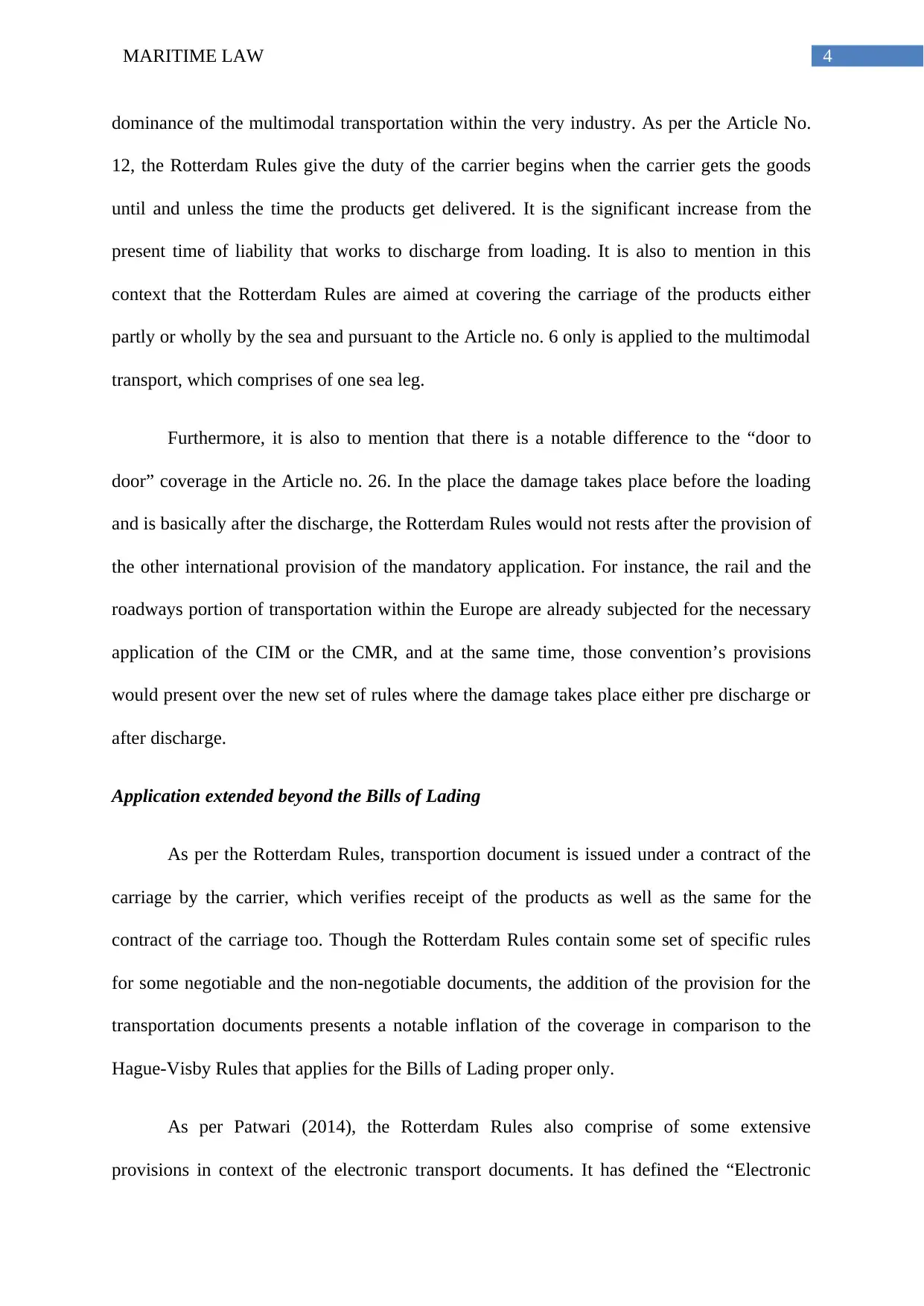
4MARITIME LAW
dominance of the multimodal transportation within the very industry. As per the Article No.
12, the Rotterdam Rules give the duty of the carrier begins when the carrier gets the goods
until and unless the time the products get delivered. It is the significant increase from the
present time of liability that works to discharge from loading. It is also to mention in this
context that the Rotterdam Rules are aimed at covering the carriage of the products either
partly or wholly by the sea and pursuant to the Article no. 6 only is applied to the multimodal
transport, which comprises of one sea leg.
Furthermore, it is also to mention that there is a notable difference to the “door to
door” coverage in the Article no. 26. In the place the damage takes place before the loading
and is basically after the discharge, the Rotterdam Rules would not rests after the provision of
the other international provision of the mandatory application. For instance, the rail and the
roadways portion of transportation within the Europe are already subjected for the necessary
application of the CIM or the CMR, and at the same time, those convention’s provisions
would present over the new set of rules where the damage takes place either pre discharge or
after discharge.
Application extended beyond the Bills of Lading
As per the Rotterdam Rules, transportion document is issued under a contract of the
carriage by the carrier, which verifies receipt of the products as well as the same for the
contract of the carriage too. Though the Rotterdam Rules contain some set of specific rules
for some negotiable and the non-negotiable documents, the addition of the provision for the
transportation documents presents a notable inflation of the coverage in comparison to the
Hague-Visby Rules that applies for the Bills of Lading proper only.
As per Patwari (2014), the Rotterdam Rules also comprise of some extensive
provisions in context of the electronic transport documents. It has defined the “Electronic
dominance of the multimodal transportation within the very industry. As per the Article No.
12, the Rotterdam Rules give the duty of the carrier begins when the carrier gets the goods
until and unless the time the products get delivered. It is the significant increase from the
present time of liability that works to discharge from loading. It is also to mention in this
context that the Rotterdam Rules are aimed at covering the carriage of the products either
partly or wholly by the sea and pursuant to the Article no. 6 only is applied to the multimodal
transport, which comprises of one sea leg.
Furthermore, it is also to mention that there is a notable difference to the “door to
door” coverage in the Article no. 26. In the place the damage takes place before the loading
and is basically after the discharge, the Rotterdam Rules would not rests after the provision of
the other international provision of the mandatory application. For instance, the rail and the
roadways portion of transportation within the Europe are already subjected for the necessary
application of the CIM or the CMR, and at the same time, those convention’s provisions
would present over the new set of rules where the damage takes place either pre discharge or
after discharge.
Application extended beyond the Bills of Lading
As per the Rotterdam Rules, transportion document is issued under a contract of the
carriage by the carrier, which verifies receipt of the products as well as the same for the
contract of the carriage too. Though the Rotterdam Rules contain some set of specific rules
for some negotiable and the non-negotiable documents, the addition of the provision for the
transportation documents presents a notable inflation of the coverage in comparison to the
Hague-Visby Rules that applies for the Bills of Lading proper only.
As per Patwari (2014), the Rotterdam Rules also comprise of some extensive
provisions in context of the electronic transport documents. It has defined the “Electronic
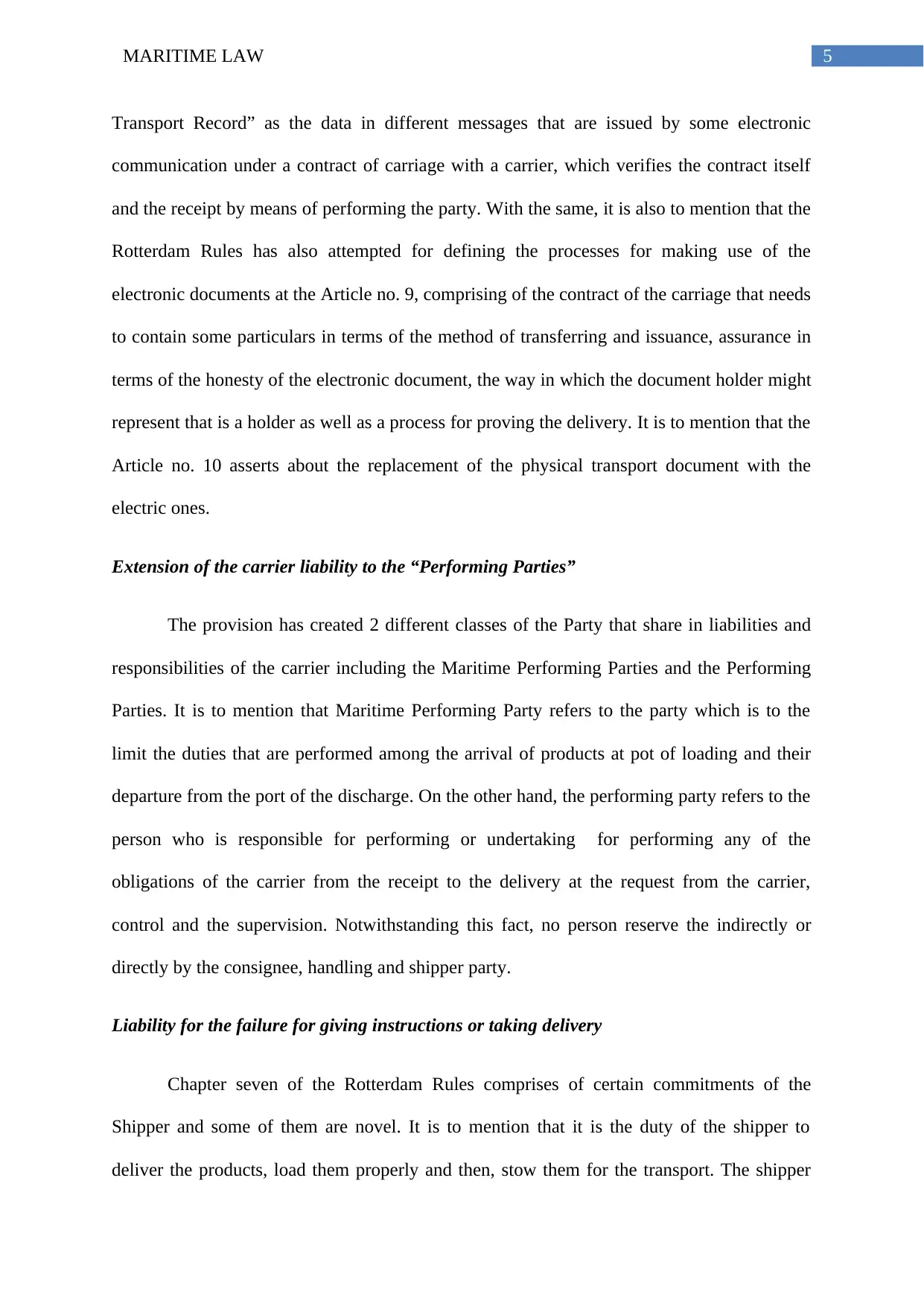
5MARITIME LAW
Transport Record” as the data in different messages that are issued by some electronic
communication under a contract of carriage with a carrier, which verifies the contract itself
and the receipt by means of performing the party. With the same, it is also to mention that the
Rotterdam Rules has also attempted for defining the processes for making use of the
electronic documents at the Article no. 9, comprising of the contract of the carriage that needs
to contain some particulars in terms of the method of transferring and issuance, assurance in
terms of the honesty of the electronic document, the way in which the document holder might
represent that is a holder as well as a process for proving the delivery. It is to mention that the
Article no. 10 asserts about the replacement of the physical transport document with the
electric ones.
Extension of the carrier liability to the “Performing Parties”
The provision has created 2 different classes of the Party that share in liabilities and
responsibilities of the carrier including the Maritime Performing Parties and the Performing
Parties. It is to mention that Maritime Performing Party refers to the party which is to the
limit the duties that are performed among the arrival of products at pot of loading and their
departure from the port of the discharge. On the other hand, the performing party refers to the
person who is responsible for performing or undertaking for performing any of the
obligations of the carrier from the receipt to the delivery at the request from the carrier,
control and the supervision. Notwithstanding this fact, no person reserve the indirectly or
directly by the consignee, handling and shipper party.
Liability for the failure for giving instructions or taking delivery
Chapter seven of the Rotterdam Rules comprises of certain commitments of the
Shipper and some of them are novel. It is to mention that it is the duty of the shipper to
deliver the products, load them properly and then, stow them for the transport. The shipper
Transport Record” as the data in different messages that are issued by some electronic
communication under a contract of carriage with a carrier, which verifies the contract itself
and the receipt by means of performing the party. With the same, it is also to mention that the
Rotterdam Rules has also attempted for defining the processes for making use of the
electronic documents at the Article no. 9, comprising of the contract of the carriage that needs
to contain some particulars in terms of the method of transferring and issuance, assurance in
terms of the honesty of the electronic document, the way in which the document holder might
represent that is a holder as well as a process for proving the delivery. It is to mention that the
Article no. 10 asserts about the replacement of the physical transport document with the
electric ones.
Extension of the carrier liability to the “Performing Parties”
The provision has created 2 different classes of the Party that share in liabilities and
responsibilities of the carrier including the Maritime Performing Parties and the Performing
Parties. It is to mention that Maritime Performing Party refers to the party which is to the
limit the duties that are performed among the arrival of products at pot of loading and their
departure from the port of the discharge. On the other hand, the performing party refers to the
person who is responsible for performing or undertaking for performing any of the
obligations of the carrier from the receipt to the delivery at the request from the carrier,
control and the supervision. Notwithstanding this fact, no person reserve the indirectly or
directly by the consignee, handling and shipper party.
Liability for the failure for giving instructions or taking delivery
Chapter seven of the Rotterdam Rules comprises of certain commitments of the
Shipper and some of them are novel. It is to mention that it is the duty of the shipper to
deliver the products, load them properly and then, stow them for the transport. The shipper
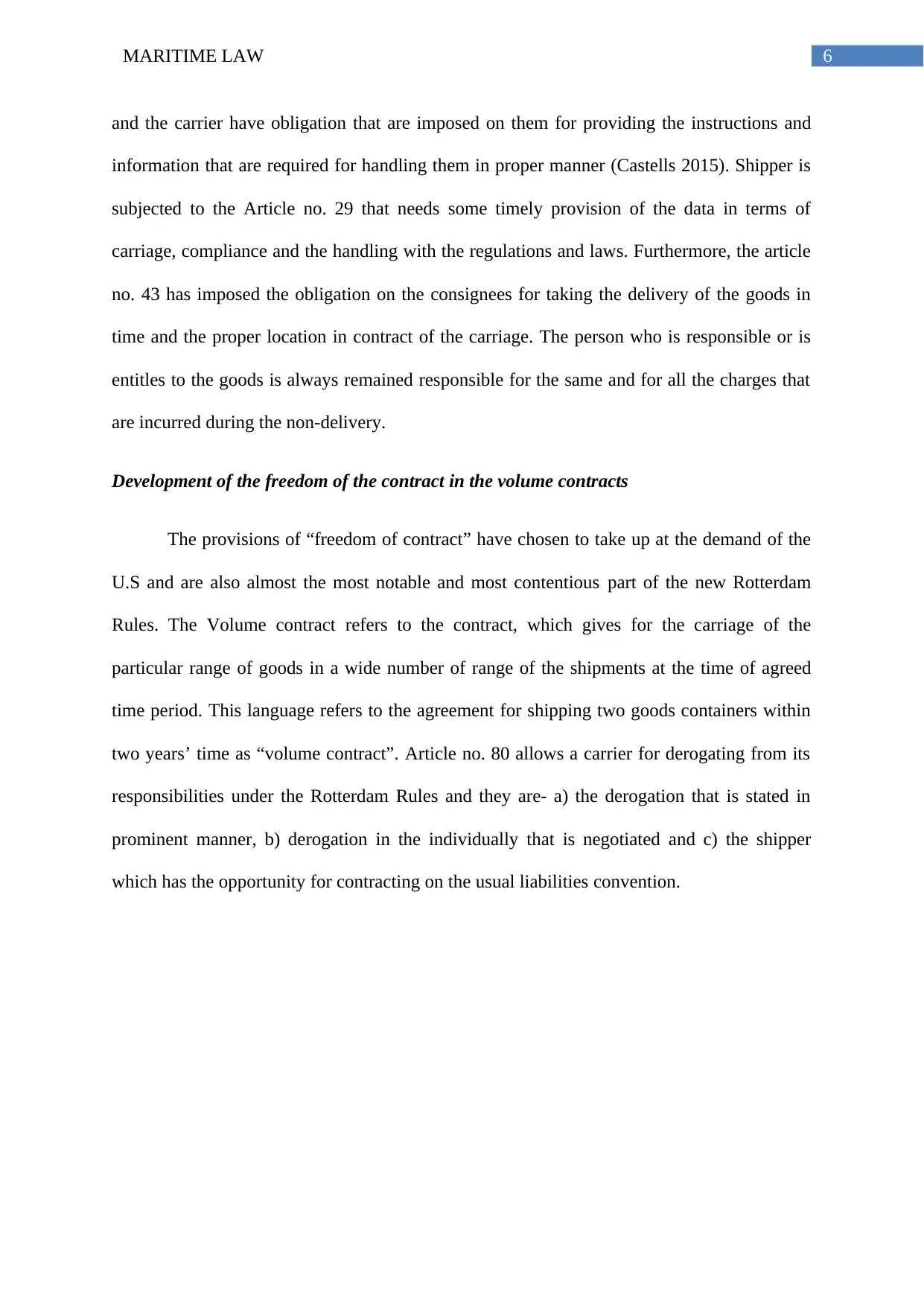
6MARITIME LAW
and the carrier have obligation that are imposed on them for providing the instructions and
information that are required for handling them in proper manner (Castells 2015). Shipper is
subjected to the Article no. 29 that needs some timely provision of the data in terms of
carriage, compliance and the handling with the regulations and laws. Furthermore, the article
no. 43 has imposed the obligation on the consignees for taking the delivery of the goods in
time and the proper location in contract of the carriage. The person who is responsible or is
entitles to the goods is always remained responsible for the same and for all the charges that
are incurred during the non-delivery.
Development of the freedom of the contract in the volume contracts
The provisions of “freedom of contract” have chosen to take up at the demand of the
U.S and are also almost the most notable and most contentious part of the new Rotterdam
Rules. The Volume contract refers to the contract, which gives for the carriage of the
particular range of goods in a wide number of range of the shipments at the time of agreed
time period. This language refers to the agreement for shipping two goods containers within
two years’ time as “volume contract”. Article no. 80 allows a carrier for derogating from its
responsibilities under the Rotterdam Rules and they are- a) the derogation that is stated in
prominent manner, b) derogation in the individually that is negotiated and c) the shipper
which has the opportunity for contracting on the usual liabilities convention.
and the carrier have obligation that are imposed on them for providing the instructions and
information that are required for handling them in proper manner (Castells 2015). Shipper is
subjected to the Article no. 29 that needs some timely provision of the data in terms of
carriage, compliance and the handling with the regulations and laws. Furthermore, the article
no. 43 has imposed the obligation on the consignees for taking the delivery of the goods in
time and the proper location in contract of the carriage. The person who is responsible or is
entitles to the goods is always remained responsible for the same and for all the charges that
are incurred during the non-delivery.
Development of the freedom of the contract in the volume contracts
The provisions of “freedom of contract” have chosen to take up at the demand of the
U.S and are also almost the most notable and most contentious part of the new Rotterdam
Rules. The Volume contract refers to the contract, which gives for the carriage of the
particular range of goods in a wide number of range of the shipments at the time of agreed
time period. This language refers to the agreement for shipping two goods containers within
two years’ time as “volume contract”. Article no. 80 allows a carrier for derogating from its
responsibilities under the Rotterdam Rules and they are- a) the derogation that is stated in
prominent manner, b) derogation in the individually that is negotiated and c) the shipper
which has the opportunity for contracting on the usual liabilities convention.
Paraphrase This Document
Need a fresh take? Get an instant paraphrase of this document with our AI Paraphraser
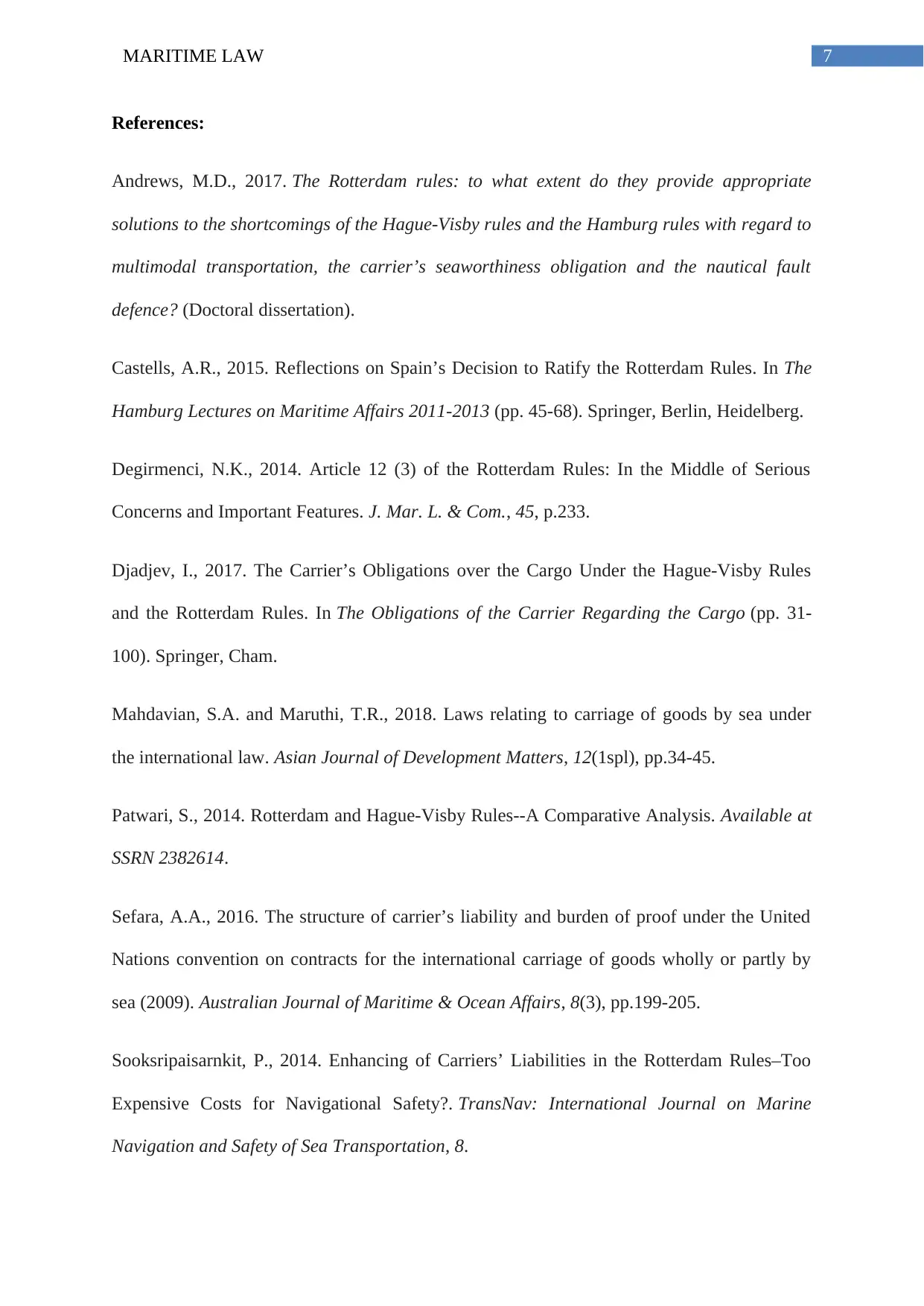
7MARITIME LAW
References:
Andrews, M.D., 2017. The Rotterdam rules: to what extent do they provide appropriate
solutions to the shortcomings of the Hague-Visby rules and the Hamburg rules with regard to
multimodal transportation, the carrier’s seaworthiness obligation and the nautical fault
defence? (Doctoral dissertation).
Castells, A.R., 2015. Reflections on Spain’s Decision to Ratify the Rotterdam Rules. In The
Hamburg Lectures on Maritime Affairs 2011-2013 (pp. 45-68). Springer, Berlin, Heidelberg.
Degirmenci, N.K., 2014. Article 12 (3) of the Rotterdam Rules: In the Middle of Serious
Concerns and Important Features. J. Mar. L. & Com., 45, p.233.
Djadjev, I., 2017. The Carrier’s Obligations over the Cargo Under the Hague-Visby Rules
and the Rotterdam Rules. In The Obligations of the Carrier Regarding the Cargo (pp. 31-
100). Springer, Cham.
Mahdavian, S.A. and Maruthi, T.R., 2018. Laws relating to carriage of goods by sea under
the international law. Asian Journal of Development Matters, 12(1spl), pp.34-45.
Patwari, S., 2014. Rotterdam and Hague-Visby Rules--A Comparative Analysis. Available at
SSRN 2382614.
Sefara, A.A., 2016. The structure of carrier’s liability and burden of proof under the United
Nations convention on contracts for the international carriage of goods wholly or partly by
sea (2009). Australian Journal of Maritime & Ocean Affairs, 8(3), pp.199-205.
Sooksripaisarnkit, P., 2014. Enhancing of Carriers’ Liabilities in the Rotterdam Rules–Too
Expensive Costs for Navigational Safety?. TransNav: International Journal on Marine
Navigation and Safety of Sea Transportation, 8.
References:
Andrews, M.D., 2017. The Rotterdam rules: to what extent do they provide appropriate
solutions to the shortcomings of the Hague-Visby rules and the Hamburg rules with regard to
multimodal transportation, the carrier’s seaworthiness obligation and the nautical fault
defence? (Doctoral dissertation).
Castells, A.R., 2015. Reflections on Spain’s Decision to Ratify the Rotterdam Rules. In The
Hamburg Lectures on Maritime Affairs 2011-2013 (pp. 45-68). Springer, Berlin, Heidelberg.
Degirmenci, N.K., 2014. Article 12 (3) of the Rotterdam Rules: In the Middle of Serious
Concerns and Important Features. J. Mar. L. & Com., 45, p.233.
Djadjev, I., 2017. The Carrier’s Obligations over the Cargo Under the Hague-Visby Rules
and the Rotterdam Rules. In The Obligations of the Carrier Regarding the Cargo (pp. 31-
100). Springer, Cham.
Mahdavian, S.A. and Maruthi, T.R., 2018. Laws relating to carriage of goods by sea under
the international law. Asian Journal of Development Matters, 12(1spl), pp.34-45.
Patwari, S., 2014. Rotterdam and Hague-Visby Rules--A Comparative Analysis. Available at
SSRN 2382614.
Sefara, A.A., 2016. The structure of carrier’s liability and burden of proof under the United
Nations convention on contracts for the international carriage of goods wholly or partly by
sea (2009). Australian Journal of Maritime & Ocean Affairs, 8(3), pp.199-205.
Sooksripaisarnkit, P., 2014. Enhancing of Carriers’ Liabilities in the Rotterdam Rules–Too
Expensive Costs for Navigational Safety?. TransNav: International Journal on Marine
Navigation and Safety of Sea Transportation, 8.
1 out of 8
Your All-in-One AI-Powered Toolkit for Academic Success.
+13062052269
info@desklib.com
Available 24*7 on WhatsApp / Email
![[object Object]](/_next/static/media/star-bottom.7253800d.svg)
Unlock your academic potential
© 2024 | Zucol Services PVT LTD | All rights reserved.



